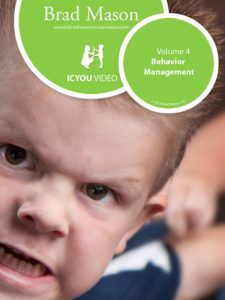Angry Refusal to Accept Responsibility
Is angry refusal to accept responsibility or blame an artifact of ADHD, Autism, or Narcissism? It breaks your heart to see someone who never learns from their mistakes. They simply can’t or won’t see their own role in the trouble they get into. What’s really weird is when you see them do the error or misbehavior, call them out on it, and they angrily assert that they didn’t do it, or worse, turn the table and start blaming you or escalating the situation with threats or acts of violence.
Which of course ends up making things worse for them. What started as minor misbehavior such as an inappropriate comment escalates into an argument with an authority figure and maybe ends with a tantrum, aggression, self-injury, running away, or property destruction. I can understand how this can happen from the perspective of poorly developed theory of mind, or perspective taking. For a more detailed explanation of theory of mind, see the excerpt from one of my books and scroll down to the fifth paragraph here https://intensivecareforyou.com/autism-aspergers-syndrome-pdd-nos-book-excerpt/
I can also explain this frustrating failure to learn from consequences and modify behavior to prevent recurrence by framing this as a problem with metacognition. For more information about assessing and remediating the role of metacognition go to my blog post here.
If you are not familiar with this thinking skill that underlies self-awareness and self-control, I highly recommend you read the brief article about metacognition to help you understand what may be happening and what you can do about it.
I’ve wondered recently, with some of the kids I work with, could this dysfunctional behavioral pattern also be a function of narcissism? That the thought of being flawed, wrong, mistaken in some way is so painful, they experience rage towards anyone who suggests they may not in one particular instance be the best, the most right, superior, infallible? Could we sometimes be overlooking the root cause of what is getting someone in trouble over and over, because they have symptoms of ADHD or Autism Spectrum Disorder, and we think it is poorly developed executive skills like emotional control or inhibition, when in fact, it may be an artifact of learned or genetically predisposed cluster B personality features?
Just to complicate things a bit further, I also wonder if their are overlaps in neurological etiology between personality disorders, ADHD, ODD, Bipolar, and Autism Spectrum Disorder? Could they all be manifested symptoms of a brain that did not quite fully develop as expected, either because physically the fetus, infant, or child was not nurtured in the most healthy way, ie exposure to toxins or drugs, congenital issues resulted in uneven development, or lastly, our culture currently does not provide an adequately healthy emotional environment to nurture a developing human being?
On the last point, I’m thinking about how children who as infants are abused or neglected, who fail to form secure attachments, end up with a sequalae of “soft neurological signs,” such as sensory processing problems, poorly developed executive skills, emotional and behavioral problems.
People and their behavior are such a mystery. This is what I love about them. So, if you had a kid who you thought might have blended features of bipolar, ADHD, or autism and narcissism, how might you adapt your intervention to address the narcissistic features that are preventing satisfactory emotional, social, and behavioral adjustment?
Would you emphasize the pain they feel over their perceived mistreatment and sense of injustice? Try to show how the smart thing to do, really, for them, would be to step back and do the really smart thing by not continuing to argue, insist on being right, deny culpability, just say okay, yes ma’am, that’s what you think?
And what about the part where they think it’s okay to work outside the rules, that they are special, the rules don’t apply to them, and they continually overestimate their abilities, expect grandiose performance and treatment, and are repeatedly enraged when their minimal investment of efforts and practice don’t yield heroic results and adulation from the multitudes as they imagined?
Hopefully, this article will help you temper your frustration with someone who displays angry refusal to accept responsibility by showing how poorly developed thinking skills may play a role in the problem.
On a simpler note, if you’d like to see my mini-course (it’s free) of behavioral strategies to help with plain old compliance, oppositional-defiance, self-esteem building, and relationship building, click here and sign up.
Teach my ADHD child responsibility and independence.
Defective and Effective Communication Patterns
For cognitive-behavioral, or thinking strategies, to teach positive thinking skills, help with getting stuck on mild teasing and bullying, and managing fearful and angry thoughts, click here and sign up.
I also have a book of counseling strategies you can view on my webpage here.

I want to create healthy happy life
It can be hard to work with a mind that keeps going to the problems and worries. It's time to teach children their power over thoughts and feelings.
I would like teachable exercises for; replacing thoughts that are not helpful, reasonable, or true, creating joy and emotional resilience, Mindgarden metaphor illustrating power and choice in thoughts, Dream Book strategy for identifying clear goals and building motivation, a video explaining how NOT to let others or situations have the power to bring you down!
